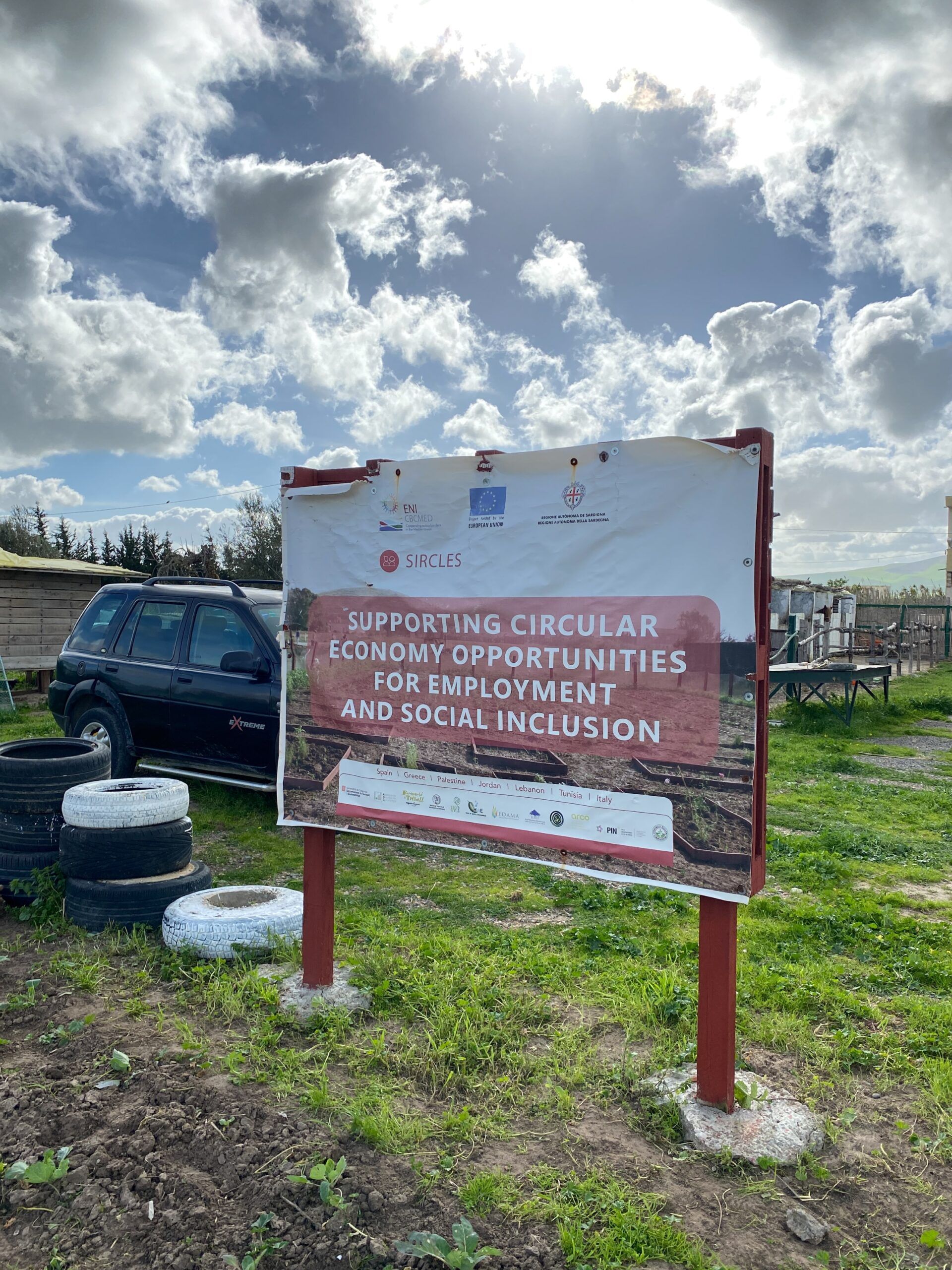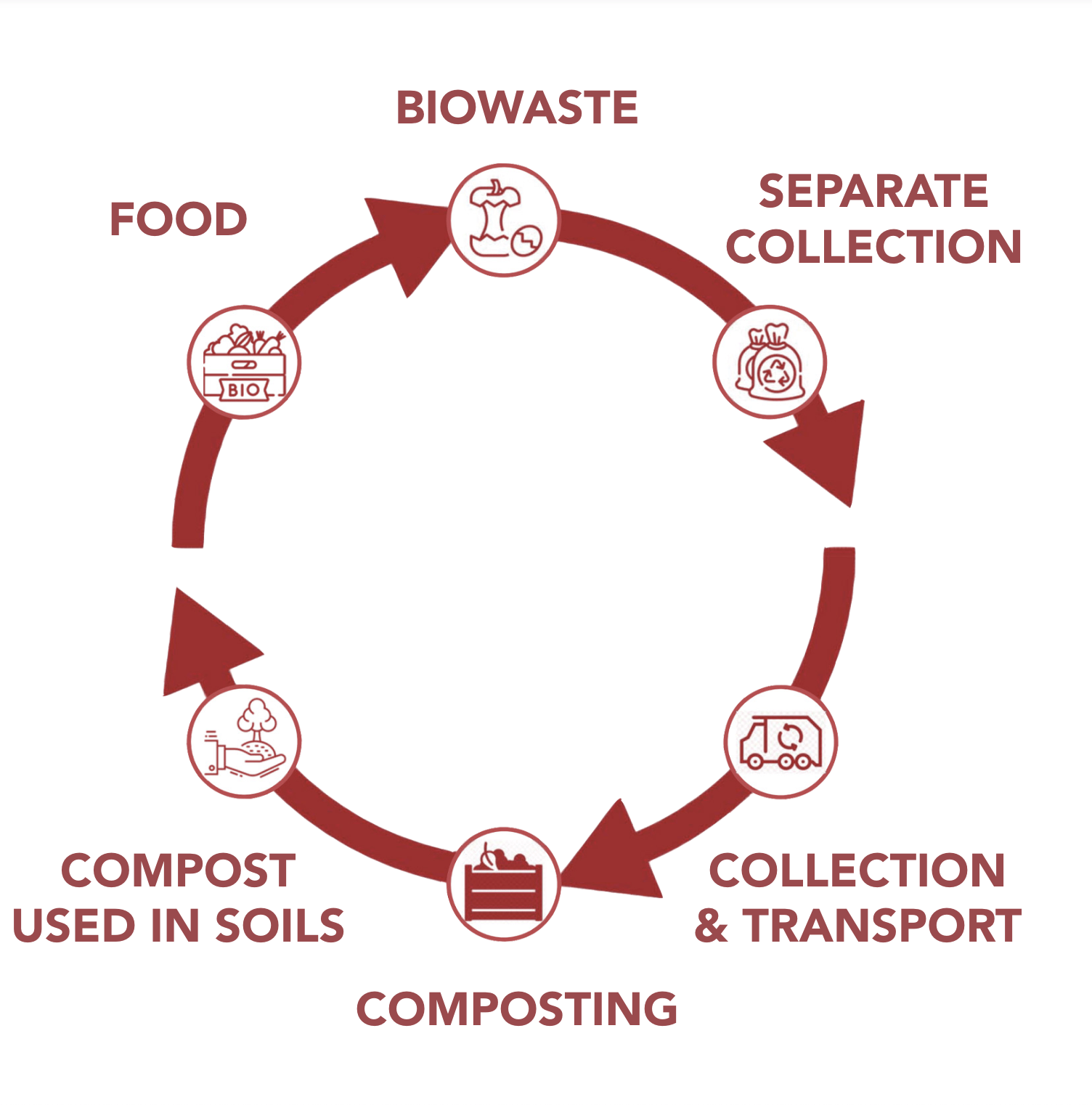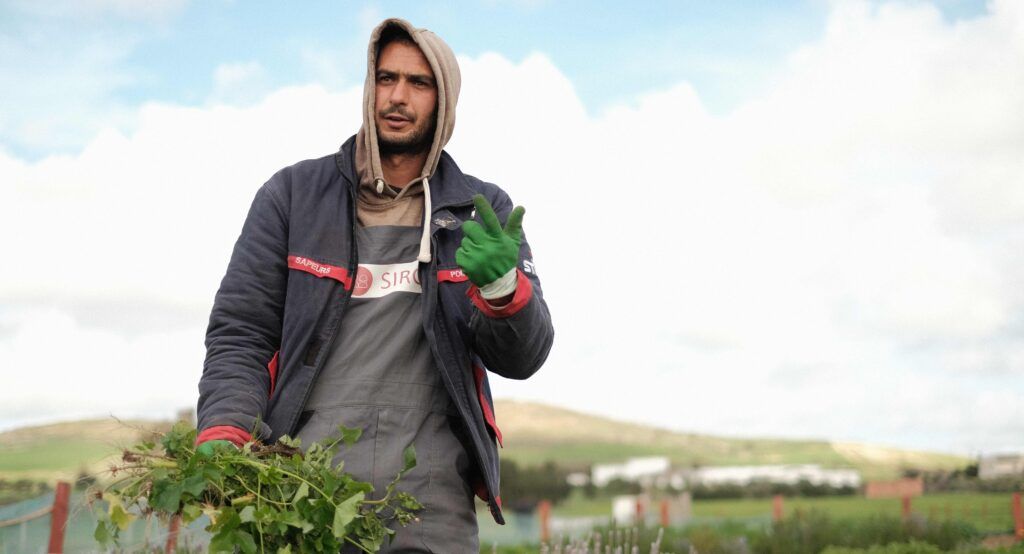Empowering youth and women with green jobs
Imagine turning everyday scraps into rich soil and new job opportunities. Composting does just that, transforming organic matter into valuable fertilizer and creating a virtuous cycle where training leads to employment and sustainable practices.
In the Mediterranean region, high unemployment is a major challenge, especially for young people and women. In Tunisia, the population faces limited job opportunities and unequal access to education. A slow labour market, low investment, and social barriers such as gender discrimination make it even more difficult to find and keep a job and can lead to serious economic and social problems. That’s where SIRCLES comes in.
Funded by ENI CBC MED with a budget of 3.8 million euros, seven Mediterranean countries – Spain, Greece, Palestine, Jordan, Lebanon, Tunisia, and Italy – came together to promote social inclusion and employment opportunities for women at risk of social exclusion and young people not in education, employment, or training (NEETs). Their project is called SIRCLES, and – through a circular economy model applied to the organic waste sector – it has led to the direct creation of more than 150 new jobs, as well as spreading the culture of composting to areas that had not yet been hooked up. Led by the Waste Agency of Catalonia, SIRCLES is a lot more than a composting project; it’s about empowering populations at risk and fostering a greener, more inclusive region.
Food waste is becoming a community treasure
 In Bizerte, Tunisia, the project operates in the community composting area built in Beni Amar by the Tunisia Ecotourism Company. In the framework of the project, 132 NEETs and women at risk of social exclusion around Bizerte received training in composting, and 80 of them were hired to work at the SIRCLES composting area.
In Bizerte, Tunisia, the project operates in the community composting area built in Beni Amar by the Tunisia Ecotourism Company. In the framework of the project, 132 NEETs and women at risk of social exclusion around Bizerte received training in composting, and 80 of them were hired to work at the SIRCLES composting area.
Surrounded by horses and chickens, the rural setting consists of organised piles of dirt and a tractor preparing the soil for composting. , Mohamed Bein Said is driving past us with his new kitten friend on his shoulder; he was trained by SIRCLES and he is now working as an employee at the site. “We were taught here that we shouldn’t throw away green waste. Recycling means processing waste so that it returns to the earth without harming nature.”

Aymen Louhichi, SIRCLES Project Manager, elaborates: “In Tunisia, there is significant soil degradation. We use a lot of chemicals in agriculture, which results in waste that we dump into public landfills, 70% of which is organic waste. Why not recycle this waste to make compost and use it in our agriculture, which is cheaper than chemical products, and healthier for us?”


It seems so simple, but the project demands a certain structure to achieve its goals. The first step is to raise awareness and to create partnerships with local stakeholders to collect and receive the waste. SIRCLES aims to collect organic waste from markets, hotels, and schools, and has set up recycling bins and processes in some neighbourhoods, a first for Tunisia. This organic waste is taken to the composting site and mixed with manure and green waste such as plants, grass, leaves, branches and wood.
The process: A community effort
The composting process involves collecting, separating, inspecting, weighing, and mixing organic waste before final composting, where the mixture is piled up and turned regularly to keep it aerated and moist. It’s a community effort.
 Workers in uniform are ready to start the day. Municipal workers join collectors in bringing organic waste from the vegetable market, hotels, and restaurants to the composting site. A tractor collects manure from nearby farms and neighbours and return to unload it at the composting site. The team then carefully inspects the collected material, removing inappropriate items such as glass. They then weight the organic waste to add extra material such as vegetable scraps, and finally the mixture is watered and piled up for composting.
Workers in uniform are ready to start the day. Municipal workers join collectors in bringing organic waste from the vegetable market, hotels, and restaurants to the composting site. A tractor collects manure from nearby farms and neighbours and return to unload it at the composting site. The team then carefully inspects the collected material, removing inappropriate items such as glass. They then weight the organic waste to add extra material such as vegetable scraps, and finally the mixture is watered and piled up for composting.
After a few months, the compost is ready. It is stored in a ventilated area and packaged to be sold in different sizes and for different uses, such as farming, hotel gardens and even educational campaigns.

The composting area in Bizerte is a pilot site that aims to spread knowledge so that partners and municipalities can replicate the idea. With this in mind, SIRCLES has created training courses specifically for young people and women. “We even established a public-private partnership to create a specific module and give our trainees state certificates” Louhichi explains.
 SIRCLES, has awarded certificates to 120 participants, certifying their professionalism and knowledge in composting and organic farming. Radhia Mejri, a trainee, says: “I used to scatter seeds randomly, so they didn’t grow. Here, I learned how to plant a tree and how to make compost. I was trained to produce (organic) fruits and vegetables like onions, parsley, roses, fennel, and peas.”
SIRCLES, has awarded certificates to 120 participants, certifying their professionalism and knowledge in composting and organic farming. Radhia Mejri, a trainee, says: “I used to scatter seeds randomly, so they didn’t grow. Here, I learned how to plant a tree and how to make compost. I was trained to produce (organic) fruits and vegetables like onions, parsley, roses, fennel, and peas.”
Education and awareness are key aspects of the SIRCLES project. By teaching people and businesses about responsible waste management, the project encourages active participation in reducing biowaste.
As a result, in the Mediterranean region, SIRCLES has trained 286 trainees from Jordan, Lebanon, Spain, Italy, Palestine, and Tunisia in biowaste management and circular economy practices. Of them, 166 were employed by the pilot projects in the partner countries. Ultimately, this initiative aims to be a model for others, providing valuable insights for future circular economy policies. Ali Essouissi, Assistant Director, say that this knowledge transfer is already happening in Tunisia: “We are training municipal staff, so that they can take this knowledge back to their communities and set up their own composting sites.”
A regional impact
At the heart of SIRCLES is a strong commitment to social inclusion. By tackling biowaste, they are addressing environmental concerns and opening doors for marginalised communities. Yosri Sassi, a young man who works at the site, was himself in a beneficiary of this educational opportunity: “I couldn’t afford to study. When this project started, I learned everything here. Before, we used to spread manure on the ground without any method, so it didn’t give any results. With the new technique, the results are immediate.”

SIRCLES’ innovative integration strategies involve raising awareness, developing waste management skills, and linking composting to ecotourism. Adapting to the local context is key to success. Louhichi points out: “There are seven countries involved in this project, and in each country, we have nine partners. According to the national context of each country, some have strengthened existing sites, while others have created new sites like ours. Sharing experiences and adapting to the local context is very important.” Each country’s unique approach can inspire others.
- Spain worked with composting expert Ramon Plana González-Sierra, in the village of Isil to establish a door-to-door waste sorting system that processes 640 tonnes of organic waste annually.
- Jordan organised capacity-building workshops for 1.000 beneficiaries, mainly women, empowering them to break traditional gender roles and to make a significant contribution to their communities.
- In Lebanon, more than 170 students took part in a green education competition, with winners receiving agricultural toolkits. The country was facing a significant waste crisis, and SIRCLES stepped in as facilities shut down and municipalities struggled for resources.
- In Italy, a green label programme for restaurants, hotels, and cafes committed to biowaste management saw 26 out of 35 participants awarded the “Bio-waste Recycler Label”.
- Palestine involved people with special needs through research in Beit Sahour, Ramallah, and Nablus, creating social enterprises led by young disabled women.
- And in Greece 20 NEETs and women from Ormos Korthiou at risk of social exclusion were trained in composting. Afterwards, all of them were employed in the SIRCLES composting unit in Korthi.
Together, the partners also produced a “Booklet of Good Practices” to share research and inspire new initiatives, to make composting accessible and welcoming to all.
Conclusion
The success of SIRCLES, raises important questions: How can we apply these lessons to other regions facing similar challenges? What other simple solutions might be out there, ready to make a difference? SIRCLES shows that combining sustainable practices with community involvement can create lasting, positive change. It encourages us all to think about how we can help build a greener and more inclusive world.

